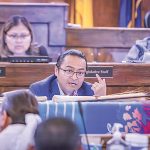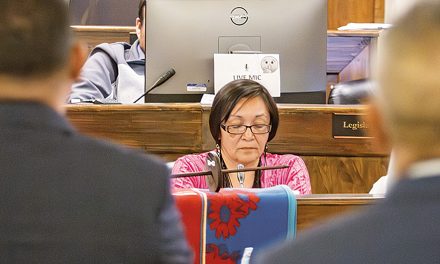
50 Years Ago: Navajo Police list 17 demands to improve jobs
It had never happened before in the tribal government. Members of the Navajo Police Department held a press conference about the “deplorable” conditions they must put up with to protect residents of the reservation.
“Our men are crying because of the conditions they have to work under,” said Lt. Gregory McKinney, who said that the police officers had come up with 17 conditions that needed to be addressed immediately.
Lt. Robert Jackson, who works in the Shiprock branch, said morale within the department has been sinking for years and would only be lifted if the tribe agreed to negotiate with the officers to make needed changes.
The officers are asking for a 25% increase in salary which they say will bring them up to the pay scales of other police officers in the area. They also wanted time and a half for overtime, a uniform allowance and improvement to their living quarters that the department provides in the more remote areas.
“We have been complaining for years to our supervisors about these problems and have been ignored. We have then gone to chapter officials and to tribal officials and still no one has addressed any of these concerns,” Jackson said.
“Instead, all that we have gotten were promises that were never kept,” he said.
Last July, during the budget sessions, he said, the police officers were promised a 25% raise but that was reduced by the Council to 15% and then 11%, said Jackson.
The police finally were given only an 8% raise.
Some officers, he said, only saw a 1.5% increase in their salaries.
A survey of police salaries in Arizona ranked the wages given to Navajo Police officers as some of the lowest in the state, he said.
Officers average 16 to 18 hours of overtime a week, none of it paid. The department said the officers contributed more than 77,000 hours of overtime in 1970.
“Our children don’t know their fathers,” McKinney said. “They know him as a police officer but because of the long hours he has to put in, they don’t know him as their daddy.”
Jackson added that because of the poor conditions within the department, the tribe has a hard time filling vacancies. And this just adds to the work that the overworked officers have to put up with.
The Tuba City Police District currently has nine vacancies, Shiprock has seven and Crownpoint has five.
A lot of officers are actively seeking jobs with other police departments that pay a decent wage and treat their officers better, he added.
The representatives of the police force met with Navajo Tribal Chairman Peter MacDonald a few days ago and said if the tribal government didn’t make an effort to address their concerns, they were going to call the news media.
Jackson said MacDonald agreed to set up a committee, to be headed by Wilbur Atcitty, the department’s police chief but he wanted the discussions postponed until after the tribal fair was held.
“We are tired of being lied to and getting promises,” said Jackson. “We want members of the tribal Council to hold a special meeting and address all of our demands,” he said.
He said the officers have decided to give the committee or the Council until Sept. 8, the day before the tribal fair begins, to come up with firm decisions on what they will be doing to address the concerns so they could take it before their fellow officers.
No one came out and said it, but there was an implied threat that if the police officers weren’t satisfied with what they were told, they would stage a sick-out during the fair, leaving it protected only by officers who annually showed up from other law enforcement agencies to help out.
After that press conference, MacDonald was asked to respond and he said he didn’t like to be threatened. He added that he felt that non-Natives were behind the actions of the police officers.
Lack of jobs
The biggest problem on the Navajo Reservation in 1971 was, without doubt, the lack of jobs, especially in the remote chapters where unemployment was listed as 80% or more.
Chapters like Low Mountain and Navajo Mountain had been begging the tribal government for years to do something about the unemployment problems they faced. This has resulted in young members of the chapter having to leave in order to find a job.
Except for those few who have jobs working for local traders, Navajos living in these remote spots could only depend on ranching and crafts such as rug weaving or silversmithing to bring in enough funds to provide for family needs.
When Peter MacDonald ran for tribal chairman in 1970, he knew this and talked about job creation at almost every one of his campaign speeches.
When he took office, according to state figures, the unemployment rate throughout the reservation averaged 65%.
In August, he made his first attempt to turning these figures around by applying for a federal grant of $8.5 million from a federal jobs program to create 1,000 new jobs on the reservation.
Art Arviso, a staff assistant to MacDonald, estimated that there were currently 33,000 Navajos living on the reservation who were seeking jobs. So the creation of 1,000 jobs would only put a dent in that figure. But it’s a start, he said.
Congress in July had set aside $8 billion to be allocated to states and communities for their economies and to lessen unemployment rates.
Arviso said if the tribe gets the money, it will use it to create jobs ranging from the low end to the middle level. He also said part of the money will be used to increase the salaries of tribal employees who were being paid far below what they should be making.
So how will the money be used?
Arviso said that will be worked out when the tribe gets word about how much it will get from the federal government. He said the tribe would have to set up programs to make use of the funds.
Within weeks of that announcement, more than 60 of the reservation’s 74 chapters passed resolutions asking for the creation of jobs in their chapters to work in administering chapter projects or on construction jobs within the chapters.
When these resolutions were brought up in subsequent interviews with Arviso, he said it was very possible that the reservation’s chapters would get some of the jobs.
Construction jobs, however, were a different matter since the federal program would not provide any funds for materials. The tribal government would have to pay for that.
Arviso also explained that these will not be temporary jobs because Congress made provisions to keep the jobs funded for several years.








 Highway 264,
Highway 264, I-40, WB @ Winslow
I-40, WB @ Winslow